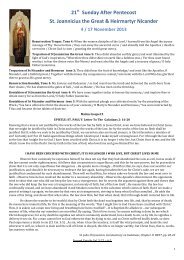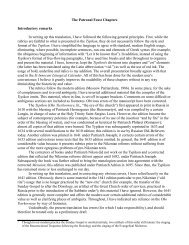9th Sunday After Pentecost Pochaev Icon of the Mother of God 23 ...
9th Sunday After Pentecost Pochaev Icon of the Mother of God 23 ...
9th Sunday After Pentecost Pochaev Icon of the Mother of God 23 ...
You also want an ePaper? Increase the reach of your titles
YUMPU automatically turns print PDFs into web optimized ePapers that Google loves.
The Gospel According To St. Mat<strong>the</strong>w 14: 22-‐34 <br />
Immediately Jesus made His disciples get into <strong>the</strong> boat and go before Him to <strong>the</strong> o<strong>the</strong>r side, while He sent <strong>the</strong> multitudes away. <br />
And when He had sent <strong>the</strong> multitudes away, He went up on <strong>the</strong> mountain by Himself to pray. Now when evening came, He was <br />
alone <strong>the</strong>re. But <strong>the</strong> boat was now in <strong>the</strong> middle <strong>of</strong> <strong>the</strong> sea, tossed by <strong>the</strong> waves, for <strong>the</strong> wind was contrary. Now in <strong>the</strong> fourth <br />
watch <strong>of</strong> <strong>the</strong> night Jesus went to <strong>the</strong>m, walking on <strong>the</strong> sea. And when <strong>the</strong> disciples saw Him walking on <strong>the</strong> sea, <strong>the</strong>y were <br />
troubled, saying, "It is a ghost!" And <strong>the</strong>y cried out for fear. But immediately Jesus spoke to <strong>the</strong>m, saying, "Be <strong>of</strong> good cheer! It <br />
is I; do not be afraid." And Peter answered Him and said, "Lord, if it is You, command me to come to You on <strong>the</strong> water." So He <br />
said, "Come." And when Peter had come down out <strong>of</strong> <strong>the</strong> boat, he walked on <strong>the</strong> water to go to Jesus. But when he saw that <strong>the</strong> <br />
wind was boisterous, he was afraid; and beginning to sink he cried out, saying, "Lord, save me!" And immediately Jesus <br />
stretched out His hand and caught him, and said to him, "O you <strong>of</strong> little faith, why did you doubt?" And when <strong>the</strong>y got into <strong>the</strong> <br />
boat, <strong>the</strong> wind ceased. Then those who were in <strong>the</strong> boat came and worshiped Him, saying, "Truly You are <strong>the</strong> Son <strong>of</strong> <strong>God</strong>." <br />
When <strong>the</strong>y had crossed over, <strong>the</strong>y came to <strong>the</strong> land <strong>of</strong> Gennesaret. <br />
THE STORM ON THE TIBERIAN SEA <br />
Last <strong>Sunday</strong>’s Gospel reading told us <strong>of</strong> a great miracle: <strong>the</strong> feeding <strong>of</strong> an enormous crowd <strong>of</strong> many thousands with <br />
five loaves and two fish. The disciples <strong>of</strong> Christ <strong>the</strong>mselves, through whose hands this miracle was performed, were <br />
dumbfounded. And as <strong>the</strong> Gospel says, Christ at once compelled <strong>the</strong>m to enter a boat and go before Him to <strong>the</strong> o<strong>the</strong>r shore <br />
while He dismissed <strong>the</strong> crowd. “And when He had sent <strong>the</strong> multitudes away, He went up into a mountain apart to pray: and <br />
when <strong>the</strong> evening was come, He was <strong>the</strong>re alone. But <strong>the</strong> ship was now in <strong>the</strong> midst <strong>of</strong> <strong>the</strong> sea, tossed with waves: for <strong>the</strong> wind <br />
was contrary. And in <strong>the</strong> fourth watch <strong>of</strong> <strong>the</strong> night Jesus went unto <strong>the</strong>m, walking on <strong>the</strong> sea” (Mt. 14:22-‐25). <br />
A wonderful image <strong>of</strong> <strong>the</strong> Church <strong>of</strong> Christ is drawn for us here. The boat, as it were, represents <strong>the</strong> Church: its sides <br />
are <strong>the</strong> rules and canons <strong>of</strong> <strong>the</strong> Church; <strong>the</strong> disciples are all <strong>of</strong> us Christians; and <strong>the</strong> stormy sea is <strong>the</strong> sea <strong>of</strong> our life. And now <br />
too Christ has ascended a mountain, which means He is sitting at <strong>the</strong> right hand <strong>of</strong> <strong>the</strong> Fa<strong>the</strong>r. He sees our Church boat and <br />
directs it. The Gospel says that <strong>the</strong> disciples went to <strong>the</strong> o<strong>the</strong>r side, not <strong>of</strong> <strong>the</strong>ir own will, but “straightway Jesus constrained <br />
His disciples to get into a ship and go before Him unto <strong>the</strong> o<strong>the</strong>r side” (Mt. 14: 22). This means <strong>the</strong>y were doing it out <strong>of</strong> <br />
obedience to Christ. And when <strong>the</strong>y found <strong>the</strong>mselves in danger, He walked to <strong>the</strong>m on <strong>the</strong> water. <br />
“And when <strong>the</strong> disciples saw Him walking on <strong>the</strong> sea, <strong>the</strong>y were troubled, saying, It is a spirit; and <strong>the</strong>y cried out for <br />
fear. But straightway Jesus spake unto <strong>the</strong>m, saying. . . It is I; be not afraid. And Peter answered Him and said, Lord, if it be <br />
Thou, bid me come unto Thee on <strong>the</strong> water. And He said, Come. And when Peter was come down out <strong>of</strong> <strong>the</strong> ship, he walked on <br />
<strong>the</strong> water, to go to Jesus”(Mt. 14:26-‐29). <br />
Notice this moment: Christ did not call Peter, but only permitted Peter. Here obedience changed to boldness, this <br />
came from Peter himself. He felt such a surge <strong>of</strong> faith, such elation, that everything seemed possible to him. But here <br />
something happened. A wave, a high wave for a second hid Christ from Peter. He found himself alone. At once cold reason set <br />
to work. It was as if he came to himself and thought, what was he doing? Foolishness. Reason took from him <strong>the</strong> lightness <strong>of</strong> <br />
faith in which he walked, and he started to drown. A desperate cry rang out: “Lord, save me.” And immediately Christ <br />
stretched forth His hand to him (Mt. 14: 30-‐31). <br />
What happened to Peter? Well, what happened to him can happen to each <strong>of</strong> us: he became frightened, his faith was <br />
shaken. And this happened because he stepped over <strong>the</strong> side <strong>of</strong> <strong>the</strong> boat. What a pr<strong>of</strong>ound lesson is hidden for us here: in <br />
Christian living <strong>the</strong>re should be evenness, <strong>the</strong>re should be quiet. And for this to be so, we must never step over <strong>the</strong> side <strong>of</strong> <strong>the</strong> <br />
Church boat. We must keep <strong>the</strong> statutes <strong>of</strong> <strong>the</strong> Church, must live <strong>the</strong> life <strong>of</strong> <strong>the</strong> Church. And <strong>the</strong>n, even if we find ourselves <br />
amid <strong>the</strong> stormy sea <strong>of</strong> life, we will be able to cry out, “Lord, save me.” And He, <strong>the</strong> Merciful One, will stretch out His saving <br />
hand to us, too, as He did to Peter, and we will find ourselves in <strong>the</strong> boat <strong>of</strong> <strong>the</strong> Church, and a great calm will come. <br />
The One Thing Needful -‐ Archbishop Andrei. <br />
Saints <strong>of</strong> <strong>the</strong> Week <br />
12 / 25 August -‐ <strong>After</strong>feast <strong>of</strong> <strong>the</strong> Transfiguration – Dormition Fast -‐ The Holy Martyrs Anicetas and Photius -‐ <strong>the</strong> <br />
Emperor Diocletian at one time visited <strong>the</strong> city <strong>of</strong> Nicomedia with <strong>the</strong> evil intention <strong>of</strong> utterly exterminating <strong>the</strong> Christians <br />
<strong>the</strong>re. But, when he began his merciless torture <strong>of</strong> <strong>the</strong> Christians, St Anicetas, one <strong>of</strong> <strong>the</strong> governors <strong>of</strong> <strong>the</strong> city, presented <br />
himself before him and courageously confessed before <strong>the</strong> Emperor his faith in Christ <strong>the</strong> Lord, <strong>God</strong> incarnate in <strong>the</strong> flesh for <br />
our salvation. Anicetas also denounced <strong>the</strong> worship <strong>of</strong> idols as that <strong>of</strong> deaf and dumb stones, unworthily worshipped by <br />
ignorant men. The furious Emperor commanded that his tongue be cut out, but Anicetas, by <strong>the</strong> power <strong>of</strong> <strong>God</strong>, continued to <br />
speak. Then a lion was let loose on him, which fawned about him. At that moment, <strong>the</strong> Temple <strong>of</strong> Hercules fell down. Photius, a <br />
kinsman <strong>of</strong> Anicetas', seeing <strong>the</strong> wonders and his kinsman's endurance, embraced him, confessed that he himself was a <br />
Christian and cried out to <strong>the</strong> Emperor: 'You should be ashamed, you idolater; your gods are nothing!' The Emperor ordered <br />
that he be beheaded immediately, but <strong>the</strong> executioner, lifting up his hand against St Photius, gave himself a blow with his <br />
sword and died. <strong>After</strong> harsh torture, <strong>the</strong> two <strong>of</strong> <strong>the</strong>m were thrown into prison, where <strong>the</strong>y remained for three years. They <br />
were <strong>the</strong>n taken out and thrown into an enormous burning furnace. Many o<strong>the</strong>r Christians, men, women and children, went <br />
into <strong>the</strong> flames voluntarily after <strong>the</strong>m, and <strong>the</strong> prayers <strong>of</strong> <strong>the</strong> Christians were heard rising from <strong>the</strong> flames, thanking <strong>God</strong> for <br />
2



